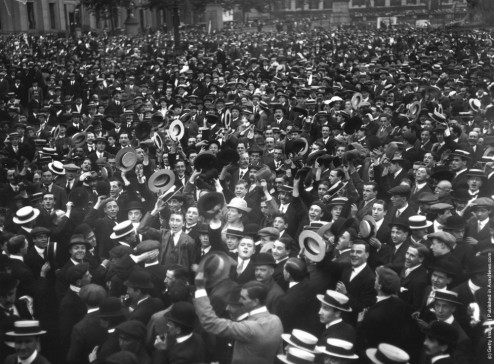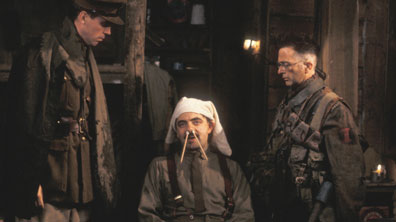‘On Receiving News of the War’
Snow is a strange white word.
No ice or frost
Has asked of bud or bird
For Winter’s cost.
Yet ice and frost and snow
From earth to sky
This Summer land doth know.
No man knows why.
In all men’s hearts it is.
Some spirit old
Hath turned with malign kiss
Our lives to mould.
Red fangs have torn His face.
God’s blood is shed.
He mourns from His lone place
His children dead.
O! ancient crimson curse!
Corrode, consume.
Give back this universe
Its pristine bloom.
NOTES
This poem describes Rosenberg’s reaction to the outbreak of the First World War, conveying the poet’s sense of anxious foreboding of the horrors ahead through a series of symbols of life, death and rebirth.
Isaac Rosenberg: Born in 1890, Isaac Rosenberg was a working class Jew who grew up in East London, the son of Russian émigrés. A talented artist, Rosenberg was nonetheless forced to leave school at the age of 14 because of his parents’ poverty (such an early end to education was typical, even encouraged for working class children at this time). He was indentured to a Fleet Street engraver and attended evening classes at Birkbeck College until some wealthy patrons clubbed together to enable him to attend Slade School of Fine Art. He completed his studies there in 1914, but moved in June to Cape Town, South Africa, due to illness. He was here when the Great War began. Rosenberg moved back to London in 1915 and joined up, primarily to provide money for his family. He was in France by early 1916 as a private soldier; like David Jones and Ivor Gurney (and in contrast to many of the most famous soldier poets) Rosenberg experienced the war not as an officer but in the ranks. Posted in France with the Kings Own Lancaster Regiment, Rosenberg was eventually sent to the Somme, where he was shot by a sniper at dawn on the 1st of April, 1918.
On Receiving News of the War: At the beginning of the First World War— and until he returned to England in March 1915— Isaac Rosenberg was living in South Africa. Suffering from chronic bronchitis in early 1914, he was told by his doctor to move to warmer climes. He relocated to Cape Town, where his sister lived. It was from here that he heard of war breaking out in Europe.
STRUCTURE: A precise and very regularly constructed poem, comprising five quatrains of simple, alternating rhyme (ABAB). Iambic trimeter (the six syllable lines, A, of three feet— hence trimeter) is followed by Iambic dimeter (the four syllable lines, B, of two feet— dimeter). This pared down, simple verse recalls the kind of verse structure that William Blake favoured in his ‘Songs of Innocence and Experience’: see ‘The Fly’ for an example of Iambic dimeter at work.
“Snow is a strange white word;”: As war is declared it is high summer in Europe, but it is winter in Cape Town, which is in the Southern Hemisphere. This is obviously a striking thing for a European like Rosenberg: snow remains alien to those in South Africa. The perplexing absence of the signs of winter chime with the poet’s alienation in Cape Town from events in Europe. Note in this first line we find the alliteration that is a strong feature of this poem.
“No ice or frost / Have asked of bud or bird / For Winter’s cost.”: in a European winter flowering plants die and birds migrate southwards. No such “cost” occurs in South Africa. This is a literal reading, of course: but underlying Rosenberg’s first verse is a metaphorical comparison of ‘Winter’ in Europe and Cape Town. Winter, of course, heralds death, just as war does. Winter is come in Cape Town, and metaphorically so in Europe: with inevitability death is on its way; yet in neither land is the cost of war yet felt. The assonance here— the repetition of long ‘O’ sounds, which persists throughout the poem— give this opening a soft and later, cumulatively, a mournful tone.
“Yet ice and frost and snow / From earth to sky / This Summer land doth know,”: The simple language typical of the poem is especially in evidence in this second verse. Common nouns are favoured instead of ‘poetic’ description. Rosenberg describes the arrival of the news of war as the arrival of “ice”, “frost” and “snow”. In choosing to describe the arrival of news of the war like this, Rosenberg lets mysterious things stand in for and symbolise events, rather describe the situation at length. The deliberately simple description gives the poem a feeling of being stripped down to essential images, a feature of Rosenberg’s writing. The “Summer land” is South Africa: its Winter is a summer to Rosenberg.
“No man knows why.”: the essential mystery behind the news— why has war erupted so strangely, even in this foreign land— is insisted on in this line. This seems to suggest that the meaning of the momentous news is impossible to know.
“In all men’s hearts it is.”: The poet begins to contemplate human motivation and the nature of the human soul. What is ‘it’ that is in all men’s hearts? Evil? Sin? What is it that causes the recurrent wars and murder in human history?
“Some spirit old / Hath turned with malign kiss / Our lives to mould.”: despite the fact that Rosenberg was Jewish, the suggestion that there is an ancient spirit of evil in man is to a European readership a particularly Christian (specifically Augustinian) one. The doctrine of Original Sin posits the idea that all humans after Adam are ‘fallen’ and, born sinful, require the redemption of Christ. The notion of a malign (or ‘evil’) kiss is also recognizably Christian: Judas of course betrayed Jesus to the Romans with a kiss. For Jewish people the personification of evil is not as pointed as in Christianity— it is not Satan who is responsible for evil but the errors of man: this too could be called a “spirit old”. The fungal (“mould”) nature of this spirit of malignity emphasises a sense slow decay rather than active evil, a spirit of entropy and death. Note another archaism here (earlier Rosenberg uses the old word “doth”)— an echo of Blake, perhaps.
“Red fangs have torn His face. / God’s blood is shed.”: ‘He’ is God. The image is an incredibly powerful, even shocking one. God, here, is very far from the one of mainstream Christian theology— omnipotent (all-powerful), omnipresent (everywhere), a spiritual rather than physical entity. Here, God has been attacked: and he sheds blood. The implication here is perhaps that God’s blood is that of those who will die in the war; but the image is uncompromising, and emphasises the power of evil, and the vulnerability of God. The use of a short end-stopped statement emphasises this (end-stopping is when a line of verse ends in a full stop).
“He mourns from His lone place / His children dead.”: Again, an image of God that is far away from the speculations of mainstream Christian theology. The image of God here is of a deity distraught, alone and removed, who mourns the death of “his children”. The unorthodox Jewish Kaballah may have provided a source for this image of God in the concept of tzimtzum, in which God by an act of will in creation contracts and withdraws from the world so that it may exist. The nature of this speculation, which explains how evil can exist in a world made by a good God, is highly unsettling.
“O! Ancient crimson curse! / Corrode, consume.”: the interjection, “O!” emphasises the emotional weight of Rosenberg’s final (desperate) appeal. Is this a cry of pain, or horror? The language here— an “Ancient crimson curse”— clearly recalls William Blake’s ‘Songs of Innocence and Experience’ (particularly ‘The Sick Rose’, which also perhaps influenced Rosenberg’s ‘A Worm Fed On the Heart of Corinth’). The “crimson curse” seems here to be that same “spirit old”; so that here Rosenberg seems to imagine the coming conflict as a kind of spiritual purging of evil that will act like water (“corrode”) or fire (“consume”) on man’s evil. Note the harsh insistence of the alliteration.
“Give back this universe / Its pristine bloom.”: The poem ends with a cosmic- spiritual perspective on human events; the coming suffering of men is placed at the very heart of the universe. The poet prays for a world renewed and returned to its original state, like to a spotless (pristine) flower. The image again recalls Blake’s ‘The Sick Rose’ (beginning, “O Rose, thou art sick!”), but also that poem’s companion in the Songs, ‘The Blossom’, which uses a flower bloom as a symbol of joy and regeneration. There is some consolation, even in the bleak vision of the world falling once again to war at the end of this poem. Rosenberg began his poem with a wintry word, “snow”: yet with this word “bloom”, he ends with a suggestion of spring— and possible renewal.
[ANTHOLOGY NOTE: This poem can be nicely compared to many of the poems written at the beginning of the war which actively seem to have welcomed the fighting. As we have seen, Rosenberg both abhors the beginning of war, and hopes dimly for some sense of renewal that will come from it. Brooke’s enthusiastic ‘Peace’ provides a powerful contrast of tone. Stylistically, I think Edward Thomas’ simple yet profound poems ‘In Memoriam (Easter 1915)’ and ‘The Cherry Trees’ are interesting to compare with Rosenberg’s symbolic style with their ideas of loss and renewal, though Thomas is precise and realist where Rosenberg is more mythical and deliberately ambiguous.]



